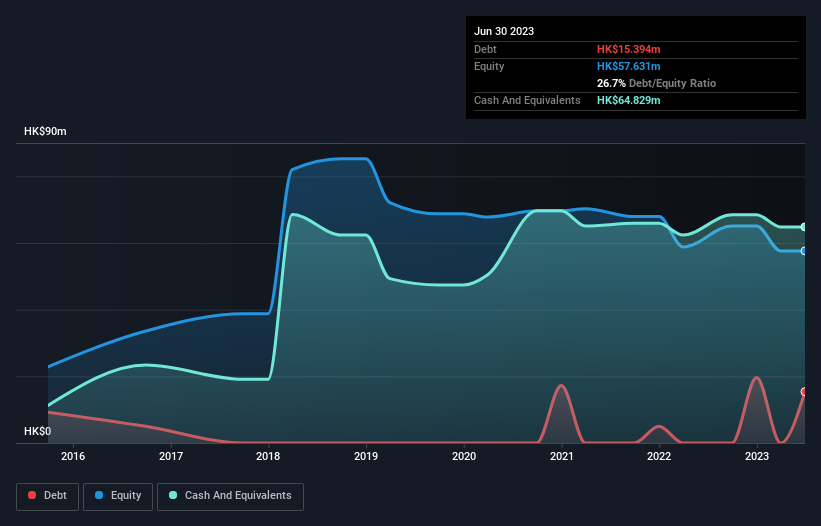David Iben put it well when he said, 'Volatility is not a risk we care about. What we care about is avoiding the permanent loss of capital.' So it seems the smart money knows that debt - which is usually involved in bankruptcies - is a very important factor, when you assess how risky a company is. We note that EDICO Holdings Limited (HKG:8450) does have debt on its balance sheet. But is this debt a concern to shareholders?
When Is Debt Dangerous?
Generally speaking, debt only becomes a real problem when a company can't easily pay it off, either by raising capital or with its own cash flow. Part and parcel of capitalism is the process of 'creative destruction' where failed businesses are mercilessly liquidated by their bankers. However, a more common (but still painful) scenario is that it has to raise new equity capital at a low price, thus permanently diluting shareholders. Having said that, the most common situation is where a company manages its debt reasonably well - and to its own advantage. The first step when considering a company's debt levels is to consider its cash and debt together.
See our latest analysis for EDICO Holdings
What Is EDICO Holdings's Debt?
As you can see below, at the end of March 2023, EDICO Holdings had HK$15.4m of debt, up from none a year ago. Click the image for more detail. But it also has HK$64.8m in cash to offset that, meaning it has HK$49.4m net cash.

How Healthy Is EDICO Holdings' Balance Sheet?
The latest balance sheet data shows that EDICO Holdings had liabilities of HK$26.1m due within a year, and liabilities of HK$6.68m falling due after that. On the other hand, it had cash of HK$64.8m and HK$6.10m worth of receivables due within a year. So it can boast HK$38.1m more liquid assets than total liabilities.
This excess liquidity is a great indication that EDICO Holdings' balance sheet is almost as strong as Fort Knox. With this in mind one could posit that its balance sheet means the company is able to handle some adversity. Succinctly put, EDICO Holdings boasts net cash, so it's fair to say it does not have a heavy debt load! When analysing debt levels, the balance sheet is the obvious place to start. But you can't view debt in total isolation; since EDICO Holdings will need earnings to service that debt. So when considering debt, it's definitely worth looking at the earnings trend. Click here for an interactive snapshot.
Over 12 months, EDICO Holdings made a loss at the EBIT level, and saw its revenue drop to HK$43m, which is a fall of 12%. That's not what we would hope to see.
So How Risky Is EDICO Holdings?
Although EDICO Holdings had an earnings before interest and tax (EBIT) loss over the last twelve months, it generated positive free cash flow of HK$9.8m. So taking that on face value, and considering the net cash situation, we don't think that the stock is too risky in the near term. There's no doubt the next few years will be crucial to how the business matures. There's no doubt that we learn most about debt from the balance sheet. But ultimately, every company can contain risks that exist outside of the balance sheet. We've identified 3 warning signs with EDICO Holdings (at least 2 which are a bit concerning) , and understanding them should be part of your investment process.
At the end of the day, it's often better to focus on companies that are free from net debt. You can access our special list of such companies (all with a track record of profit growth). It's free.
Valuation is complex, but we're here to simplify it.
Discover if EDICO Holdings might be undervalued or overvalued with our detailed analysis, featuring fair value estimates, potential risks, dividends, insider trades, and its financial condition.
Access Free AnalysisHave feedback on this article? Concerned about the content? Get in touch with us directly. Alternatively, email editorial-team (at) simplywallst.com.
This article by Simply Wall St is general in nature. We provide commentary based on historical data and analyst forecasts only using an unbiased methodology and our articles are not intended to be financial advice. It does not constitute a recommendation to buy or sell any stock, and does not take account of your objectives, or your financial situation. We aim to bring you long-term focused analysis driven by fundamental data. Note that our analysis may not factor in the latest price-sensitive company announcements or qualitative material. Simply Wall St has no position in any stocks mentioned.
About SEHK:8450
EDICO Holdings
An investment holding company, provides integrated pre- and post-printing services to financial and capital markets in Hong Kong.
Flawless balance sheet with low risk.
Market Insights
Community Narratives




